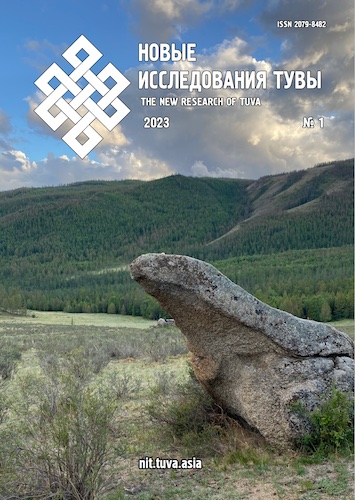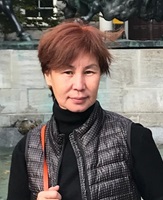Images of the native land in the musical and song culture of the Tuvans
DOI:
https://doi.org/10.25178/nit.2023.1.5Keywords:
Tuvans; song culture of Tuvans; yrylar; Tuvan folk songs; native land; cher; earthAbstract
The article presents the findings of an analysis of the image of the native land in the musical and song culture of the Tuvans and its changes in different historical periods (from the early 20th century to the present day). The scholar considers the images of the native land (‘торээн чер’ / ‘toreen cher’) in folk songs, songwriters’ songs based on folk motifs, Tuvan Soviet and post-Soviet songs. The sources comprised lyrics of songs in Tuvan from collections of different years, as well as specific songs, including two anthems of the Republic of Tuva: “Tooruktug dolgai tañdym” (“The Taiga Filled with Pine Nuts”) (1993–2011) and “Men, Tyva men” (“I am a Tuvan”) (from 2011 to the present).
In folk songs, the images of home ground are concretized and emotionally tinged. These are places where people live, which are imagined as breadwinners, guardians and keepers. People are openhearted to their native places and share feelings with them. They admire these lands, complain and share sorrow with them, and nature sympathizes with humans. In songwriters’ songs that are based on folk motifs and have been written since the 1930s, we can see the broadening of the singers’ outlook — from the local area to the whole of Tuva, as well as the appearance of a collective subject — “we”. In Soviet Tuvan songs, there are almost no lyrical singers who have a reverential attitude to their native lands. The latter are viewed as nature which people must conquer and subject to their will in order to become happy and successful. They call the Soviet Union their homeland (‘торээн чурт’ / ‘toreen churt’).
In Tuvan songs of the post-Soviet period, native places (‘торээн чер’ / ‘toreen cher’) are considered as lands within the borders of Tuva again and praised lyrically. Contemporary songwriters emphasize the ethnicity and ethnic identity of the Tuvans. These songs do not contain the image of a huge country, motifs of conquest, etc. But there are themes of unity, the kin relations between people and the earth again. This was also reflected in the main song of Tuva — its national anthem.
References
Aksenov, A. N. (1964) Tuvinskaia narodnaia muzyka [Tuvan folk music]. Moscow, Muzyka. 255 p. (In Russ.).
Artanovsky, S. N. (2012) Rodina kak kul'turno-istoricheskii fenomen [Homeland as a cultural and historical phenomenon]. Vestnik Sankt-Peterburgskogo gosudarstvennogo universiteta kul'tury i iskusstv, no. 2 (11), pp. 11–15. (In Russ.).
Bezhenaru, L. E. (2020) Kontsept «malaia rodina» kak mental'noe i smyslovoe prostranstvo [The concept of “small homeland” as a mental and semantic space]. Sotsial'no-psikhologicheskie problemy mental'nosti / mentaliteta, no. 16, pp. 17–27. (In Russ.).
Davletshin, G. M. and Zeleneev, Yu. A. (2015) Predstavlenie o Rodine i rodnoi zemle u tiurko-tatar [Ideas about Motherland and native land among the Turkic Tatars]. Vestnik Kazanskogo gosudarstvennogo universiteta kul'tury i iskusstv, no. 4–2, pp. 40–44. (In Russ.).
Zhelamsky, A. G. (2018) Neugasimaia Rodina : k teme obraznogo vospriiatiia landshaftov [Perpetual Motherland: To the theme of metaphoric perception of landscapes]. Nasledie i sovremennost', vol. 1, no. 4, pp. 95–110. (In Russ.).
Zhiznennoe prostranstvo i dukhovnyi mir cheloveka cherez prizmu iazykov Sibiri [The living space and the spiritual world of man through the prism of the languages of Siberia] (2021) / ed. by N. B. Koshkareva and E. V. Tiunteshev. Novosibirsk, Akademizdat. 300 p. (In Russ.).
Karelina, E. K. (2009) Istoriia tuvinskoi muzyki ot padeniia dinastii Tsin do nashikh dnei [The history of Tuvan music from the fall of the Qing dynasty to the present day]. Moscow, Kompozitor. 552 p. (In Russ.).
Kenin-Lopsan, M. B. (2021) Traditsionnaia kul'tura tuvintsev [Traditional culture of the Tuvans]. Kyzyl, Detskii literaturnyi sait “Raduga Tuvy” ; Tuvan Book Publishing House. 242 p. (In Russ.).
Koshkendei, I. M. (2018) Rodina v narodnykh pesniakh altaiskikh tuvintsev [Homeland in the folk songs of the Altai Tuvans]. In: Töv Azi bolon Mongol dakh' ugsaatny üil iavts, chig khandlaga. Sedevt olon ulsyn erdem shinzhilgeenii khurlyn ilkheluudiin emkhtgel [International scientific conference “Etnographic Process and Tendency in Central Asia and Mongolia”]. Ulaanbaatar khot. 264 p. Pp. 123–127. (In Russ.).
Kyrgys, Z. K. (1992) Pesennaia kul'tura tuvinskogo naroda [Song culture of the Tuvan people]. Kyzyl, Tuvan Book Publishing House. 144 p. (In Russ.).
Kyrgys, Z. K. (2002) Tuvinskoe gorlovoe penie: etnomuzykovedcheskoe issledovanie [Tuvan throat singing: An ethnomusicological research]. Novosibirsk, Nauka. 236 p. (In Russ.).
Lamazhaa, Ch. K. (2021a) Deti dlia tuvintsev: izmeneniia otnosheniia v sotsiokul’turnykh transformatsiia [Tuvans’ views on children: Changes of the attitudes in socio-cultural transformations]. New Research of Tuva, no. 4, pp. 57–75. (In Russ.). DOI: https://doi.org/10.25178/nit.2021.4.5
Lamazhaa, Ch. K. (2021b) Ocherki sovremennoi tuvinskoi kul'tury [Essays on modern Tuvan culture]. St. Petersburg, Nestor-Istoriia. 192 p. (In Russ.).
Lamazhaa, Ch. K., Kuzhuget, Sh. Yu. and Mongush, A. V. (2022) Khoi e"di dlia tuvintsev. Identichnost', udobstvo, otvetstvennost' [Khoi edi for Tuvans. Identity, convenience, responsibility]. Etnografiia, no. 4, pp. 151–174. (In Russ.). DOI: https://doi.org/10.31250/2618-8600-2022-4(18)-151-174
Levin, T. K. (2009) Zanovo otkryvaia Tuvu [Rediscovering Tuva]. New Research of Tuva, no. 4, pp. 304–313. (In Russ.).
Levin, T. (2012) Muzyka novykh nomadov. Gorlovoe penie v Tuve i za ee predelami [The music of the new nomads. Throat singing in Tuva and beyond]. Moscow, Klassika–XXI. 336 p. (In Russ.).
Lukov, V. A. and Lukov, Vl. A. (2008) Tezaurusy: sub"ektnaia organizatsiia gumanitarnogo znaniia [Thesauri: The subjective organization of humanities knowledge]. Moscow, The National Institute of Business Publ. 784 p. (In Russ.).
Mongush, A. A. (2018) Kontsept Rodina v stikhotvoreniiakh altaiskikh tuvintsev [The concept of Homeland in the poems of Altai Tuvans]. In: Töv Azi bolon Mongol dakh' ugsaatny üil iavts, chig khandlaga. Sedevt olon ulsyn erdem shinzhilgeenii khurlyn ilkheluudiin emkhtgel [International scientific conference “Etnographic Process and Tendency in Central Asia and Mongolia”]. Ulaanbaatar khot. 264 p. Pp. 127–131. (In Russ.).
Mongush, A. A. and Bavuu-Syuryun, M. V. (2020) Leksicheskie reprezentatsii kontsepta «Rodina» v stikhotvornykh tekstakh tuvinskikh pisatelei [Lexical representations of the concept of Motherland in poetic texts of Tuvan writers]. Iazyki i fol'klor korennykh narodov Sibiri, no. 2, issue 40, pp. 106–117. (In Russ.). DOI: https://doi.org/10.25205/2312-6337-2020-2-106-117
Moshina, E. A. (2020) Simvolizm zemli-Rodiny v russkoi lingvokul'ture [Symbolism of the earth-Motherland in the Russian linguistic culture]. Izvestiia Volgogradskogo gosudarstvennogo pedagogicheskogo universiteta, no. 4 (147), pp. 123–128. (In Russ.).
Ondar, M. V. (2016) Otrazhenie kategorii prostranstva v tuvinskom iazyke (na materiale geroicheskogo eposa «Boktug-Kirish, Bora-Sheleei» [Reflecting the category of space in the Tuvan language (by the material of the heroic epos “Boktug-Kirish, Bora-Sheelei”)]. Filosofskie nauki. Voprosy teorii i praktiki, no. 2 (56), pp. 129–134. (In Russ.).
Perevoznikova, A. K. (2019) Kontsept «rodina» kak sostavliaiushchaia natsional'nogo obraza Rossii v russkoi iazykovoi kartine mira [The “rodina” concept as a component of the national image of Russia in the Russian language picture of the world]. Concept: Philosophy, Religion, Culture, no. 1 (9), pp. 54–61. (In Russ.). DOI: https://doi.org/10.24833/2541-8831-2019-1-9-54-61
Radlov, V. V. (1868) Obraztsy narodnoi literatury tiurkskikh plemen, zhivushchikh v Iuzhnoi Sibiri [Samples of folk literature of Turkic tribes living in Southern Siberia]. St. Petersburg, Printing House of the Imperial Academy of Sciences. Part 2. XXII, 710, 420 (In Russ.).
Sodnompilova, M. M. (2007) Kontsept Rodina v kul'ture mongol'skikh narodov [The concept of Homeland in the culture of the Mongolian peoples]. Etnograficheskoe obozrenie, no. 3, pp. 124–134. (In Russ.).
Stepanov, Yu. S. (2004) Konstanty: slovar' russkoi kul'tury [Constants: Dictionary of Russian culture]. 3rd ed., revised and enlarged. Moscow, Akademicheskii proekt. 992 p. (In Russ.).
Stepanova, E. A. (2015) «Vse prokhodit. Ostaetsia Rodina — to, chto ne izmenit nikogda»: obraz Rodiny v sovetskoi pesne [“Everything passes. Only Motherland remains, the one which would never be unfaithful”: Image of Motherland in Soviet song]. Labirint. Zhurnal sotsial'no-gumanitarnykh issledovanii, no. 4, pp. 28–42. (In Russ.).
Suzukei, V. Yu. (2007) Muzykal'naia kul'tura Tuvy v XX stoletii [The musical culture of Tuva in 20th century]. Moscow, Publishing House “Kompozitor”. 408 p. (In Russ.).
Tatarintsev, B. I. (2008) Etimologicheskii slovar' tuvinskogo iazyka [An etymological dictionary of the Tuvan language]. Novosibirsk, Nauka. Vol. IV. 442 p. (In Russ.).
Tuvintsy. Rodnye liudi [Tuvans. Native people] (2022) / Ch. K. Lamazhaa, N. D. Suvandii, Sh. Yu. Kuzhuget and Sh. B. Mainy ; ed. by Ch. K. Lamazhaa and N. D. Suvandii. St. Petersburg, Nestor–Istoriia. 360 p. (In Russ.).
Khertek, A. B. (2015) Kategoriia prostranstva v tuvinskikh fol'klornykh tekstakh [The category of space in Tuvan folklore texts]. Aktual'nye problemy gumanitarnykh i estestvennykh nauk, no. 3–1, pp. 326–329. (In Russ.).
Khertek, L. K. (2018) Kontsept «prostranstvo» v epicheskoi kartine mira [The concept “space” in the epic world view]. Filologicheskie nauki. Voprosy teorii i praktiki, no. 6–2 (84), pp. 402–407. (In Russ.). DOI: https://doi.org/10.30853/filnauki.2018-6-2.46
Chikaeva, T. A. (2021) Fenomen Rodiny kak tsennost' kul'tury (na materialakh russkoi filosofii 19–20 vekov) [The phenomenon of the Motherland as a cultural value (based on the materials of Russian philosophy of the 19th and 20th centuries)]. Gumanitarnye vedomosti TGPU im. L. N. Tolstogo, no. 3 (39), pp. 107–114. (In Russ.). DOI: https://doi.org/10.22405/2304-4772-2021-1-3-107-117
Chugunekova, A. N. (2017) Kontsept chir (‘zemlia’) v iazykovoi kartine mira khakasov [The concept of chir (earth) in the language world picture of the Khakass people]. Mir nauki, kul'tury, obrazovaniia, no. 3 (64), pp. 338–342. (In Russ.).
Shchelokova, L. I. (2022) Kontsept «rodnaia zemlia» v publitsistike voennykh let [Concept of ‛native land’ in journalism of war years]. Studia Litterarum, vol. 7, no. 2, pp. 220–231. (In Russ.). DOI: https://doi.org/10.22455/2500-4247-2022-7-2-220-231
Peemot, V. (2020) Emplacing herder-horse bonds in Ak-Erik, South Tyva. In: Multispecies households in the Saian mountains: Ecology at the Russia-Mongolia border / ed. by A. Oehler and A. Varfolomeeva. Lanham, MD : Lexingtion Books. xxiv, 271 p. Pp. 51–72.
Purzycki, B. G. (2011) Tyvan cher eezi and the socioecological constraints of supernatural agents' minds. Religion, Brain & Behavior, vol. 1, no. 1, pp. 31–45. DOI: https://doi.org/10.1080/2153599X.2010.550723
Published
How to Cite
For citation:
Sanchay Ch. Kh. Obrazy rodnoi zemli v muzykal’no-pesennoi kul’ture tuvintsev [Images of the native land in the musical and song culture of the Tuvans]. New Research of Tuva, 2023, no. 1, pp. 80-109. (In Russ.). DOI: https://doi.org/10.25178/nit.2023.1.5
Issue
Section

This work is licensed under a Creative Commons Attribution-NonCommercial 4.0 International License.

Author(s) license holder(s) grant rights for their work to the journal (grantee of a license) under the simple non-exclusive open license in accordance with Art. 1286.1 «Open license for a research work, work of literature or fine arts», Civil Code of the Russian Federation.
New Research of Tuva publishes articles under the Creative Commons Attribution-NonCommercial license (CC BY-NC).
Since it is an open license, author(s) reserve the right to upload the article to their institutional repository, submit it to another journal (if it allows republications), or republish it on their own website (in full, or in part).
However, several conditions apply here:
a) The republished version must always contain the name(s) and affiliation(s) of the author(s), the original title and the hyperlink to the original version on the New Research of Tuva website;
b) It must be in open access, free of charge, and no category of readers must be in any way whatsoever advantaged over general readership.
c) should the contribution be submitted elsewhere by its author(s) without substantial modification (30% or more of original text unchanged), the body of the article should contain a disclaimer that the original version was published in New Research of Tuva (with a link to the respective page)
The CC-BY-NC is a non-revocable license which applies worldwide and lasts for the duration of the work’s copyright.









